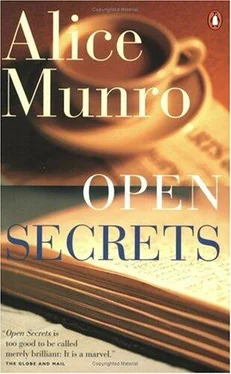Old Annie enjoyed the fuss of being waited on and ate a lot, picking up the chicken bones to work the last shred of meat off them. Children lurked around the doorways and the women talked in subdued, rather scandalized voices out in the kitchen. The young man, Treece Herron, had the grace to sit down with us and drink a cup of tea while we ate. He chatted readily enough about himself and told me he was a divinity student at Knox College. He said he liked living in Toronto. I got the feeling he wanted me to understand that divinity students were not all such sticks as I supposed or led such a stringent existence. He had been tobogganing in High Park, he had been picnicking at Hanlan’s Point, he had seen the giraffe in the Riverdale Zoo. As he talked, the children got a little bolder and started trickling into the room. I asked the usual idiocies … How old are you, what book are you in at school, do you like your teacher? He urged them to answer or answered for them and told me which were his brothers and sisters and which his cousins.
Old Annie said, “Are you all fond of each other, then?” which brought on funny looks.
The woman of the house came back and spoke to me again through the divinity student. She told him that Grandpa was up now and sitting on the front porch. She looked at the children and said, “What did you let all them in here for?”
Out we trooped to the front porch, where two straight-backed chairs were set up and an old man settled on one of them. He had a beautiful full white beard reaching down to the bottom of his waistcoat. He did not seem interested in us. He had a long, pale, obedient old face.
Old Annie said, “Well, George,” as if this was about what she had expected. She sat on the other chair and said to one of the little girls, “Now bring me a cushion. Bring me a thin kind of cushion and put it at my back.”
I spent the afternoon giving rides in the Stanley Steamer. I knew enough about them now not to start in asking who wanted a ride, or bombarding them with questions, such as, were they interested in automobiles? I just went out and patted it here and there as if it was a horse, and I looked in the boiler. The divinity student came behind and read the name of the Steamer written on the side. “The Gentleman’s Speedster.” He asked was it my father’s.
Mine, I said. I explained how the water in the boiler was heated and how much steam-pressure the boiler could withstand. People always wondered about that — about explosions. The children were closer by that time and I suddenly remarked that the boiler was nearly empty. I asked if there was any way I could get some water.
Great scurry to get pails and man the pump! I went and asked the men on the veranda if that was all right, and thanked them when they told me, help yourself. Once the boiler was filled, it was natural for me to ask if they would like me to get the steam up, and a spokesman said, it wouldn’t hurt. Nobody was impatient during the wait. The men stared at the boiler, concentrating. This was certainly not the first car they had seen but probably the first steam car.
I offered the men a ride first, as it was proper to. They watched skeptically while I fiddled with all the knobs and levers to get my lady going. Thirteen different things to push or pull! We bumped down the lane at five, then ten miles an hour. I knew they suffered somewhat, being driven by a woman, but the novelty of the experience held them. Next I got a load of children, hoisted in by the divinity student telling them to sit still and hold on and not be scared and not fall out. I put up the speed a little, knowing now the ruts and puddle-holes, and their hoots of fear and triumph could not be held back.
I have left out something about how I was feeling but will leave it out no longer, due to the effects of a martini I am drinking now, my late-afternoon pleasure. I had troubles then I have not yet admitted to you because they were love-troubles. But when I had set out that day with Old Annie, I had determined to enjoy myself as much as I could. It seemed it would be an insult to the Stanley Steamer not to. All my life I found this a good rule to follow — to get as much pleasure as you could out of things even when you weren’t likely to be happy.
I told one of the boys to run around to the front veranda and ask if his grandfather would care for a ride. He came back and said, “They’ve both gone to sleep.”
I had to get the boiler filled up before we started back, and while this was being done, Treece Herron came and stood close to me.
“You have given us all a day to remember,” he said.
I wasn’t above flirting with him. I actually had a long career as a flirt ahead of me. It’s quite a natural behavior, once the loss of love makes you give up your ideas of marriage.
I said he would forget all about it, once he got back to his friends in Toronto. He said no indeed, he would never forget, and he asked if he could write to me. I said nobody could stop him.
On the way home I thought about this exchange and how ridiculous it would be if he should get a serious crush on me. A divinity student. I had no idea then of course that he would be getting out of Divinity and into Politics.
“Too bad old Mr. Herron wasn’t able to talk to you,” I said to Old Annie.
She said, “Well, I could talk to him.”
Actually, Treece Herron did write to me, but he must have had a few misgivings as well because he enclosed some pamphlets about Mission Schools. Something about raising money for Mission Schools. That put me off and I didn’t write back. (Years later I would joke that I could have married him if I’d played my cards right.)
I asked Old Annie if Mr. Herron could understand her when she talked to him, and she said, “Enough.” I asked if she was glad about seeing him again and she said yes. “And glad for him to get to see me,” she said, not without some gloating that probably referred to her dress and the vehicle.
So we just puffed along in the Steamer under the high arching trees that lined the roads in those days. From miles away the lake could be seen — just glimpses of it, shots of light, held wide apart in the trees and hills so that Old Annie asked me if it could possibly be the same lake, all the same one that Walley was on?
There were lots of old people going around then with ideas in their heads that didn’t add up — though I suppose Old Annie had more than most. I recall her telling me another time that a girl in the Home had a baby out of a big boil that burst on her stomach, and it was the size of a rat and had no life in it, but they put it in the oven and it puffed up to the right size and baked to a good color and started to kick its legs. (Ask an old woman to reminisce and you get the whole ragbag, is what you must be thinking by now.)
I told her that wasn’t possible, it must have been a dream.
“Maybe so,” she said, agreeing with me for once. “I did used to have the terriblest dreams.”
On the night of Eunie Morgan’s disappearance, Rhea was sitting in the bootlegger’s house at Carstairs — Monk’s — a bare, narrow wooden house, soiled halfway up the walls by the periodic flooding of the river. Billy Doud had brought her. He was playing cards at one end of the big table and a conversation was going on at the other end. Rhea was seated in a rocking chair, over in a corner by the coal-oil stove, out of the way.
“A call of nature, then, let’s say a call of nature,” a man was saying, who had formerly said something about a crap. Another man had told him to watch his language. Nobody looked at Rhea, but she knew she was the reason.
“Out on the rocks to answer a call of nature. And he was thinking he’d like a piece of something, to come in handy. Though he didn’t naturally expect to find it there. And what does he see? Sees this stuff laying around. Sheets of it, laying around. If that isn’t the very thing! Laying all over, in sheets. So he picks it up and stuffs it in his pockets and thinks, Plenty for the next time. Doesn’t think any more about it. Back to the camp.”
Читать дальше












